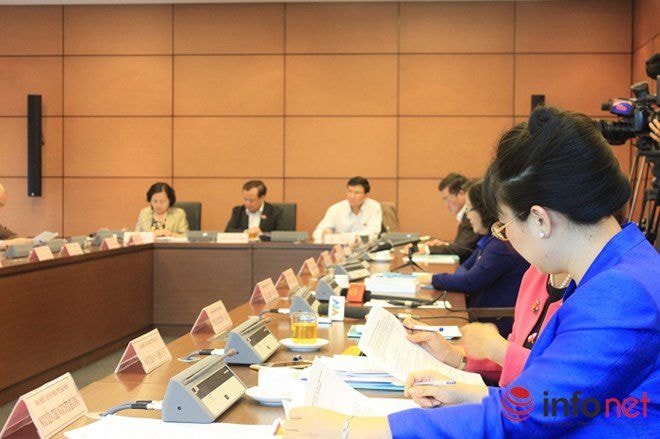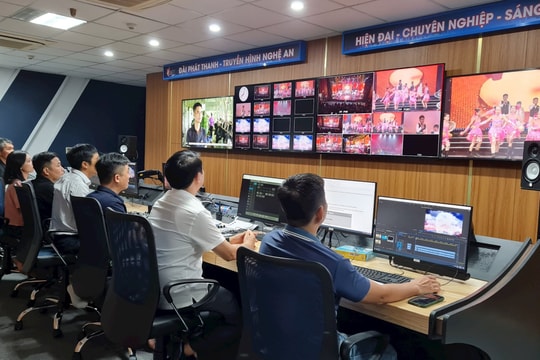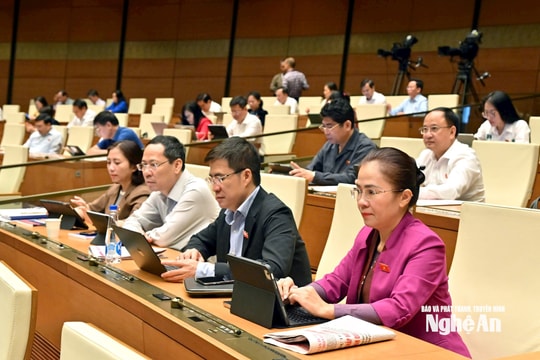Amended Press Law: Articles "inciting violence and bloodshed" should be banned.
Delegate Nguyen Thi Quoc Khanh agreed with the prohibited content and behaviors recorded in the draft Press Law, and suggested adding more details to the prohibitions, including banning articles that incite violence and superstition.
 |
| Hanoi group meeting |
The National Assembly discussed in groups the Press Law (amended). Many opinions agreed with the new provisions in the Draft Press Law. Below are the comments of the National Delegates of Hanoi:
Delegate Nguyen Thi Quoc Khanh (Hanoi): There needs to be a mechanism to protect journalists.
Speaking at the group meeting on the Press Law (amended), Deputy Nguyen Thi Quoc Khanh (Hanoi) continued to affirm that the press is a forum and a bridge between the people and the state. However, the press also needs to be free but within the framework of the law. Countries have many instabilities, so if the social press is not well managed, there will be many risks of social instability. Highly appreciating the State's management of the press, Ms. Nguyen Thi Quoc Khanh said that the press management work has initially stabilized society. The responsibility of the press is very commendable and needs to continue to be promoted.
Delegate Nguyen Thi Quoc Khanh expressed her concern about some specific contents. Ms. Khanh agreed with the prohibited contents and behaviors listed in the draft law. Delegate Khanh suggested adding more details to the prohibition, prohibiting articles that “incite violence and bloodshed”.
In addition, delegate Nguyen Thi Quoc Khanh also commented on point f, clause 1, article 10, adding information on "superstitious customs" and some other points.
In particular, Delegate Khanh expressed support for the new points in the Draft Press Law. However, the delegate was concerned about the issue of protecting journalists. Many journalists who practice correctly are still being violated and hindered... Therefore, it is necessary to strictly handle these acts and have a mechanism to ensure the right to work of the press. Delegate Khanh also pointed out the phenomenon of state agencies having issued access cards to journalists and reporters but then hindering journalists from accessing information. Delegate Nguyen Thi Quoc Khanh also shared the difficulties, hardships and dangers of journalists in creating journalistic works to serve the community.
Delegate Bui Thi An (Hanoi): Amending the Press Law is necessary
Delegate Bui Thi An affirmed: The amendment is necessary. However, the delegate also expressed concern: “In the recent period, there have been many press agencies, an explosion of information. Voters have also welcomed many good articles, but there are also articles that are offensive, incorrect in knowledge, incorrect in science...
Delegate Bui Thi An also said: In the reorganization, there are press agencies that are completely autonomous, and there are press agencies that receive budget. There are also press products of poor quality, sold by channel, by order. Delegate Bui Thi An said that we should rearrange the focal points, manage them tightly but not lose freedom of speech. Delegate An said that we should not allow private press, but in the long run we should allow it, if we manage it well.
Delegate Nguyen Pham Y Nhi (Hanoi): "Just assigning the Vietnam Journalists Association to improve journalists' ethics is not enough"
Delegate Nguyen Pham Y Nhi expressed his opinion: "Basically agree with the submission and review report on the Press Law (amended)". However, Delegate Y Nhi also expressed concern about the regulations ensuring the right to expression. For example, Clause 1, Article 11 stipulates: "Citizens have the right to participate in press activities according to the provisions of law and are protected by the State". Clause 4, Article 11 stipulates: "Citizens have the right to express information; participate in monitoring and social criticism in the press" and Article 13 on press agencies ensuring citizens' freedom of speech and freedom of the press.
Delegate Nguyen Pham Y Nhi highly appreciated the progress of these regulations. However, Delegate Nguyen Pham Y Nhi expressed concern that press agencies would find it difficult to meet the people's desire for expression.
Another issue that makes delegate Nguyen Pham Y Nhi very concerned is the issue of ethics of journalists. According to the delegate, in recent years the contribution of the press to social life is very large. However, there are also signs of deviations in journalistic ethics, but the professional ethics of the press have not been managed. In Article 9 of the Draft, only assigning the Journalists Association to improve ethics is not enough.
In addition, delegate Nguyen Pham Y Nhi also asked whether there are regulations on civic ethics for citizens participating in the press. When there are some comments that are vulgar and offensive, citizens participating in the press must also have ethics.
Delegate Do Kim Tuyen (Hanoi): "Need to clarify the standards for granting press cards"
Concerned more about the issue of granting press cards, Delegate Do Kim Tuyen raised many questions about the conditions and criteria for granting cards to journalists. According to Delegate Do Kim Tuyen, this regulation needs to be stated more clearly.
Regarding this issue, delegate Tuyen hopes that the law will clearly state the issuance and confiscation of press cards, whether they can be reissued and how long it will take to reissue them. Cases where a card is not issued are only related to the case, in which cases a card has not been issued and in which cases it has not been issued.
Newspapers in practice use many collaborators, so what are the regulations regarding this?
Delegate Do Kim Tuyen proposed to add more regulations in the prohibition related to the State's diplomatic viewpoint (Article 10, Draft Law on Press Amendment). According to Delegate Do Kim Tuyen, it should be stipulated that the press is not allowed to provide false information about foreign diplomatic viewpoints. Currently, only domestic prohibitions are determined without taking into account foreign issues.
Most Venerable Thich Bao Nghiem (Hanoi): "It is necessary to ban more anti-Party content"
Delegate, Venerable Thich Bao Nghiem, is concerned about Article 10 of the draft, which regulates prohibited content. According to Venerable Thich Bao Nghiem, it is necessary to add the acts and content of “anti-Party”, “information distorting religious beliefs…” to the prohibited content.
At the same time, Venerable Thich Bao Nghiem also requested that Information promote bad customs, superstitions, and heresies. Information about mystical stories, new scientific issues that have not been concluded, causing confusion in society, negatively affecting national security, order, social safety and community health;
National Assembly Delegate Nguyen Phi Thuong: "If we lose financially, the press will lose ideologically"
Delegate Nguyen Phi Thuong expressed concern that the subject of regulation of the Press Law does not include social media. For press agencies, each article must be clearly verified and must go through a certain process.
But, nowadays, with just a Smartphone, users can be both reporters and editors-in-chief. Social media has nothing to control. I think this bill is not enough. On one side, a strong area, the story, the mechanism of press and media operations. A profitable career, orienting political and ideological thinking.
There are two opposing issues. On one side, the press agency is a financially autonomous and commercially viable unit, on the other side, the press is oriented towards information and communication.
Recently, the Ministry of Information and Communications has made a press plan. We impose targets, collect them, and force the press to be financially autonomous. Some large units have radio, television, and print newspapers, and their revenue streams are very large. Basically, newspapers advertise little. Therefore, there are collaborators who collect a percentage of advertising, creating many press consequences.
The production and business related part still has problems. The problem is advertising revenue. What are the priorities, incentives, and policies when the tax is reduced from 25% to 20%, and the tax on electronic newspapers is 20%.
Delegate Nguyen Phi Thuong is concerned that newspaper advertising revenue is not even a fraction of social media like FB, losing in terms of financial autonomy and ideological tools.
According to Infonet.vn




